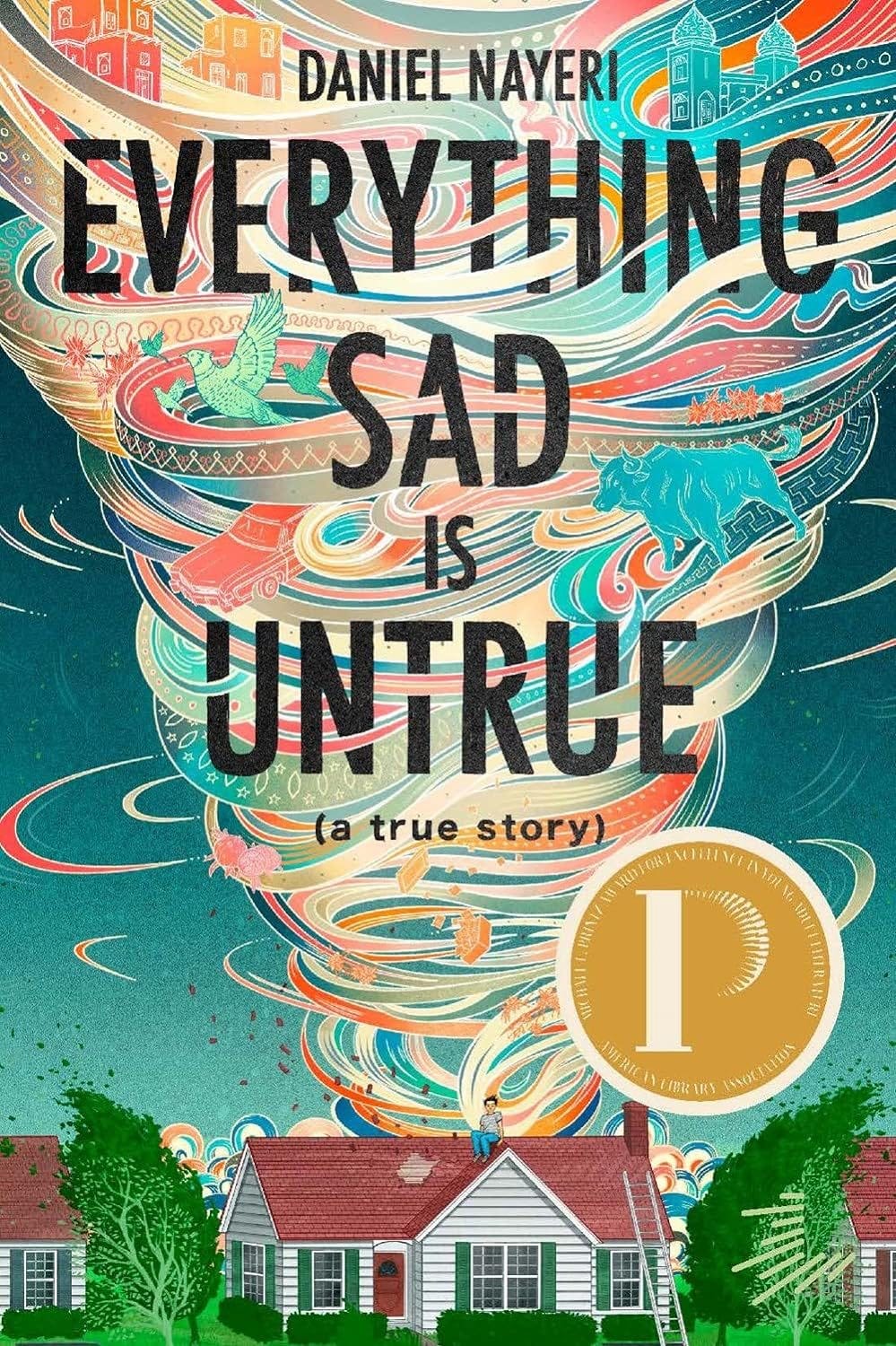Welcome to Reading Revisited, a place for friends to enjoy some good old-fashioned book chat while revisiting the truth, beauty, and goodness we’ve found in our favorite books.
Futures
by Mildred Bevel
After that final short and sweet section we are done with Trust. We have been given all the pieces to the puzzle we are going to get and now are left to put them together. For this week’s final section of the book I will simply leave you with some quotes and musings on a few themes to help us all process what we have read. The amount that Diaz packs into such a short section is impressive.
If you have time before your book club I would encourage you to reread this section again. Rereading always bears fruit, but was there ever such low hanging rereading fruit as this?
This week’s section is so hard to summarize so instead of providing a linear summary I will simply state some of the things we learn about Mildred and Bevel.
Mildred is a musical and mathematical genius.
Vanner’s and Bevel’s portrayals of her were both incomplete.
Mildred was the mastermind behind Bevel’s fortune and the 1929 Stock Market Crash (that caused the Great Depression…thinking about this in its historical context makes it pack a bigger punch).
Mildred has hidden some of her mastermindness(?) by leading Bevel to think that he is actually the one making decisions. Like the call and response of music. It is inevitable.
This makes me wonder how much Bevel was trying to deceive the world or how much was simply self deception.
Mildred and Harold Vanner are corresponding while she is sick.
The house party circus acts from Vanner’s novel are a reality from Mildred’s past.
Notes and Quotes
The nature of this section of the book leads me to introduce some new themes into our discussion.
Future(s)
First, let’s talk about the title of this section: Futures. I want to bring us back to a quote in Harold Vanner’s novel about Helen’s fictional diaries.
Because she felt lost in the new tyrannical architecture of her brain, and because she no longer trusted her thoughts or her memory, she started relying on her journals, which she kept with daily rigor. She hoped her future self, the one reading the diaries, would be able to use those writings as a measure of how far into her delirium she had gone. Would she see herself on the page? She addressed herself constantly in her entries, asking herself to believe that it was, in fact, she who had written those words in the past-even if her future self refused to believe it; even if, as she read, she were unable to recognize her own handwriting. (83)
I can only respond to this with a lot of questions…Are we Helen/Mildred? Or is this a reference to Ida reading the diaries? Is money destroying us all? Is the reason that Vanner made her mind break is because the mind and body are so interconnected and both can be broken by money? Or is it just guilt?
The ticker fell behind me, and for a few minutes I owned the future. (387)
I can’t help but think that Mildred, in these moments, was living in time that didn’t belong to her and that now she is “paying it back.”
The other aspect of the title of this book to note is that futures are also a type of investment (as are Bonds for that matter). And then all through this section Mildred is musing on the future of music and one’s ability to predict it.
Music
Speaking of music…
This music creates an unavoidable future for itself. It has no free will. There’s only fulfilment. It’s fatal music. (366)
In her diary Mildred is constantly musing on the church bells. When later in the section she mentions that she never heard the stock exchange bell it became a powerful image.
This description of the weaving of the themes of money and music is intriguing…
My 1929 plan was much like the bell motif.
Short selling is folding back time. The past making itself present in the future.
Like a retrograde or a palindrome.
D F# E A / A E F# D
A song played in reverse.
…
Every loss becomes a gain, every increase a drop. (398)
Mutation/Disease
Mildred talks a lot about the frailty of her body in her last sickness. She even goes so far as to say that the cancer is a punishment for what she did in the 1929 Stock Market Crash.
All of life’s peculiarities result from a long series of mutations. I wonder what the cells mutating within my body would turn me into, if they didn’t kill me first. (367)
Another aspect of this that gets brought up is when Mildred is remembering her “acts” from childhood. She implies that people felt the need to bring her down because she was a child.
For some reason, they felt they had to destroy me. Their faces disfigured as they squinted + grinned with the impossible effort of thinking up problems larger than their minds. They kept going until I was defeated by their absurdities. (374)
Death
This exchange between Mildred and Bevel makes me ask a lot of questions.
“I’ve been doing this for too long. Done.”
…
“But you live for this,” he said at last. “You…”
He regretted his words.
“Exactly. And now it’s over.” (380)
Is the money killing her or was it what she was living for and setting it aside is killing her? Did it have to kill her or is it because a woman “can’t survive” in that world? I like that Diaz brings up the questions, but doesn’t answer them. Instead he leaves us pondering and even asking more questions back.
Masks/Hiding
I am so glad that I started tracking this theme at the beginning because it really panned out in this last section. To everyone’s surprise it was actually a woman behind it all.
Where there’s a ventriloquist, there’s a dummy. The latter word only sounds worse than the former. He disliked being told what to do. I disliked being pushed further into the shadows + speaking only through him. (382)
I like the way that Diaz has flipped this theme on its head. We think of the the ventriloquist as the one being in power, but Mildred doesn’t enjoy that role.
Women/Men
I have been waiting to bring up Taylor Swift’s song, The Man, for weeks while we’ve been reading. I think it is finally time. Go take a listen!
But on a more serious note I thought it was so interesting that being “in control” actual makes Bevel feel like less of a man.
He felt unmanned, he once said. (386)
When Mildred wants her hair cut, it is not just a little trim she is looking for. Her nurse won’t do it so she starts to do it for herself. The nurse ends up cutting it as short as she wants it and Andrew looks angry when he sees it. At first I wasn’t sure what to do with this scene, but then I realized: She looks like a man.
Memory
Here I will leave you with a few beautiful quotes about memory…
The Doppler effect of memory. The pitch of past events shifting as they rush away from us. (389)
And I will leave you with this hauntingly beautiful quote…
The terrifying freedom of knowing that nothing, from now on, will become a memory (402)
Other Resources
Now that you have finished the book it is time to check out some other resources that might open up the book to you and lead to deeper conversation at our book clubs! Here are a few interviews with the author (I have listened to each and recommend them!) and
Close Reads Podcast series! Enjoy!Interviews with Hernan Diaz
New York Times Book Review Podcast
Late Night with Seth Myers (this one is hilarious at parts)
Do you want to know more about the pen and his handwritten manuscript?(this one is a little cheesy, but still interesting)
Close Reads Podcast Episodes
Part Three: A Memoir, Remembered
Discussion Questions
Which author do you trust the most?
Which was your favorite “book” to read?
Discuss some of the themes we have looked at…
Aesthete of money
Monkish qualities
American myth making instinct
Money’s ability to distort reality
The relationship between history and fiction/fact and fabrication
Women
Masks/Hiding
Dopplegangers/Mirrors
Future and Time
Music
Death
Memory
Are you satisfied at the end of this novel or do you wish you had more information?
Did you figure out all of the “secrets” when Diaz told you or were you putting the clues together earlier?
Does anyone have any musical or financial knowledge that they want to enlighten us on to give us a deeper understanding of this book?
Reading Schedule
Friday, May 16th- Introduction and Reading Schedule
Monday, May 19th- ep. 55: Introduction to Trust w/ Sean Johnson (from Close Reads)
Wednesday, May 21st- Bonds by Harold Vanner (pgs 3-126)
Wednesday, May 28th- My Life by Andrew Bevel (pgs 127-192)
Wednesday, June 4th- A Memoir, Remembered by Ida Partenza (pgs 193-360)
Wednesday, June 11th- Futures by Mildred Bevel (pgs 361-402)
Thursday, June 26th- Trust Virtual Book Club (contact us for a link to the zoom meeting)
Monday, July 7th- ep. 63: Revisiting Trust
Until next time, keep revisiting the good books that enrich your life and nourish your soul.
In Case You Missed It:
On the Podcast:
What We’re Reading Now/Next:
June
Trust by Hernan Diaz
July
August
Northanger Abbey by Jane Austen
A Few Reminders:
If you are wanting to get in on the in person or virtual community please contact us!
We have turned on paid subscriptions which will allow you to support the work we are doing here as well as receive Read Along Guide PDFs each month and voice recordings of the Read Along Guides.
If you would like to make a small contribution to the work we’re doing here at Reading Revisited, we invite you to do so with the Buy (Us) a Coffee button below. We so appreciate your support!
*As always, some of the links are affiliate links. If you don’t have the books yet and are planning to buy them, we appreciate you using the links. The few cents earned with each purchase you make after clicking links (at no extra cost to you) goes toward the time and effort it takes to keep Reading Revisited running, and we appreciate it!










I love your thought about Mildred “paying it back” with her cancer. And did not pick up on the short hair and Mildred looking like a man. Always a treat to read the guides and discover insight I missed!
It's interesting that you ask if I was satisfied with the ending--I found this deeply satisfying and will definitely stick it on the list of books I recommend to others! It's more than this, but it's a thoroughly modern mystery novel experience--I can't believe I fell for the "mental illness" red herring in Part 1. The truth of the matter is there *ALL ALONG* and it's somewhat wonderful to have been duped this way.